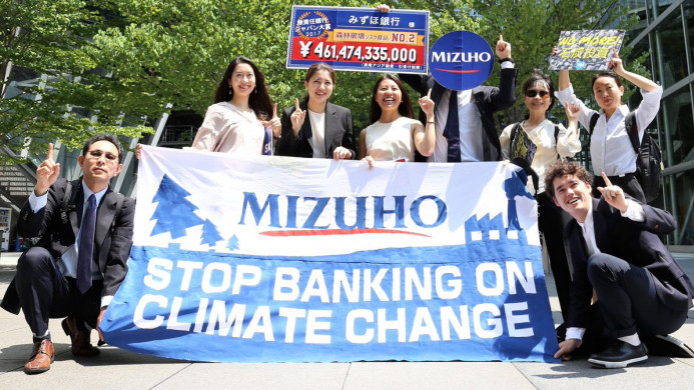Massive global shareholder backing for Mizuho climate shareholder proposal

A first-ever Japanese climate shareholder proposal received massive international investor backing at Mizuho Financial Group’s (Mizuho) shareholder meeting today, with 35% of shareholders, worth well over US$500bn, voting for the proposal. Notably, the two largest international proxy advisors, Glass Lewis and ISS, both recommended in its favour.
The resolution, filed by Kiko Network, calls on Mizuho to disclose a plan to ensure its investments align with the goals of the Paris Climate Agreement.
“With such massive shareholder support, global investors have today sent a powerful message to Mizuho, and to corporate Japan as a whole, that corporate business needs a plan to align with the Paris Climate Agreement,” said Kimiko Hirata, International Director of Kiko Network.
“The road to financial ruin is already paved with companies which have failed to adapt to the accelerating transition to a zero carbon world. With billions of dollars at stake, this proposal indicates the extent to which investors are getting serious. It’s time for Mizuho to take serious steps.”
While Mizuho released a new sustainability policy on 14 April, many investors have found it fell well short of the expectations set out in the shareholder proposal, both in terms of scope and ambition.
Specifically, the new policy only provided targets covering a small fraction of Mizuho’s lending, and does not provide a plan on how Mizuho will align the rest of its investments with the goals of the Paris Agreement. Additionally, the targets provided in the policy are not aligned with the climate goals of the Paris Agreement.
Indeed, according to the latest research, from 2016 to 2019 alone, Mizuho provided US$4.24 billion in lending and underwriting to coal power. Mizuho even reportedly remains involved in project finance for the controversial Vung Ang 2 coal-fired power station in Vietnam. At its AGM, Mizuho stated it will strengthen its climate policy by reducing its investment in coal-fired power generation facilities to zero by 2040, rather than 2050. Also Mizuho emphasized it will press for transition in high risk sectors, such as utilities.
“Mizuho, as well as other businesses in Japan, need to fully understand the climate crisis means investment risk,” said Hirata. “While this result lays down a firm marker on expectations, when it comes to greater investor pressure, this first resolution is just a starting point. What is required for Mizuho is to strengthen its policy further and demonstrate that its business strategy is aligned with the Paris Agreement. All corporates in Japan have to do the same.”
